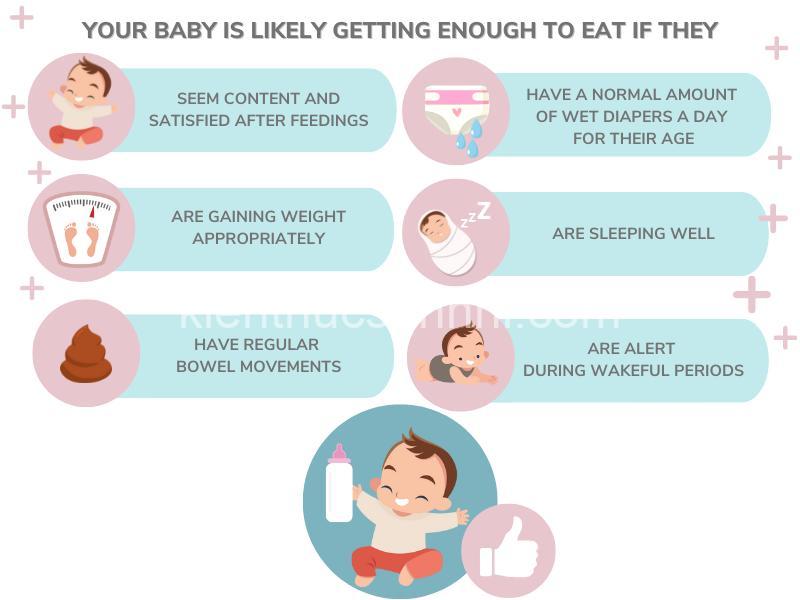
Baby Nutrition: Ensuring Your Little One Gets Enough to Thrive. In today’s article, kienthucsannhi.com will explore with you in the most detailed and complete way. See now!
Understanding Your Baby’s Nutritional Needs
Every baby has different nutritional needs based on their age, activity level, and even health conditions. It’s important to recognize that a baby’s nutritional requirements change as they grow, so staying informed is essential.
Why nutrition is crucial for babies: Imagine a tiny seed, just starting its journey to becoming a strong, vibrant plant. It needs the right nutrients to germinate, sprout, and eventually blossom into a beautiful flower or a sturdy tree. That’s precisely what happens with your baby! Their growth and development depend on getting the right fuel in the form of essential nutrients.
Essential nutrients: Think of these as the building blocks for a healthy, happy baby. They include:
- Calories: Think of these as the energy source that powers your baby’s active little body.
- Vitamins: Like tiny superheroes, vitamins play a crucial role in everything from vision and immunity to bone strength and cell growth.
- Minerals: Just like the minerals that make up the earth, these are essential for strong bones, healthy blood, and proper brain function.
Factors affecting baby’s nutritional needs:
- Age: A newborn baby’s needs differ significantly from a six-month-old. As your baby grows, their energy requirements change, and their bodies need different proportions of nutrients.
- Activity level: A baby who spends hours playing actively requires more calories than a baby who spends a lot of time sleeping.
- Health conditions: Certain health conditions can affect a baby’s nutritional needs. For example, a baby with a digestive issue might need a special formula or a modified diet.

Breastfeeding: The Gold Standard for Baby Nutrition
Breast milk is nature’s perfect food for babies. It’s packed with essential nutrients, antibodies, and protective factors that help your baby thrive.
Benefits of breastfeeding:
- Immune system support: Breast milk contains antibodies that help protect your baby from infections and illnesses.
- Reduced risk of allergies: Babies who are breastfed are less likely to develop allergies and other immune-related problems.
- Enhanced cognitive development: Studies show that breastfeeding can improve cognitive skills and brain development in babies.
- Improved bonding: Breastfeeding promotes close bonding between mother and baby, which is essential for your baby’s emotional development.
Frequency and duration of breastfeeding:
- Frequency: Breastfeed on-demand, meaning whenever your baby shows signs of hunger. This might be every 2-3 hours, especially for newborns.
- Duration: Aim for around 12-15 minutes per breast.
Signs of adequate milk intake:
- Frequent wet diapers: Your baby should have at least six wet diapers per day.
- Weight gain: Your baby should be gaining weight steadily, according to their age and developmental stage.
- Contentment: Your baby should seem happy and content after feeding.
Addressing challenges and seeking support:
- Common challenges: Breastfeeding can be challenging, and moms may face issues like latch problems, pain, or low milk supply.
- Support: If you’re facing any difficulties, don’t hesitate to seek help from a lactation consultant, healthcare professional, or support group.
Formula Feeding: A Safe and Effective Alternative
Formula feeding is a great alternative to breastfeeding, especially for moms who are unable or choose not to breastfeed. It’s a safe and effective way to nourish your baby.
Types of formula:
- Cow’s milk-based: This is the most common type of formula, and it’s usually suitable for most babies.
- Soy-based: This formula is suitable for babies who are allergic to cow’s milk.
- Hypoallergenic: This formula is designed for babies who are sensitive to common milk proteins.
Choosing the right formula:
- Consult your pediatrician: Your pediatrician can help you choose the right formula based on your baby’s individual needs.
- Consider allergies: If your baby has allergies, your pediatrician can advise on the best formula options.
Preparing formula safely and correctly:
- Follow manufacturer instructions: Always follow the instructions on the formula can carefully.
- Water temperature: Use lukewarm water, not too hot or too cold.
- Measuring scoops: Use the scoop provided with the formula to ensure you’re using the correct amount.
- Storage: Store prepared formula in the refrigerator for up to 24 hours.
Signs of adequate formula intake:
- Frequent wet diapers: Your baby should have at least six wet diapers per day.
- Weight gain: Your baby should be gaining weight steadily, according to their age and developmental stage.
- Contentment: Your baby should seem happy and content after feeding.
Introducing Solid Foods: A Gradual Process
Starting solids is a significant milestone in your baby’s journey. It’s a gradual process that requires careful planning and patience.
When to introduce solids:
- Around 6 months: Most babies are ready for solid foods around 6 months.
- Signs of readiness: Your baby can sit up with support, has good head control, and shows interest in food.
Types of first foods:
- Single-ingredient purees: Start with purees made from single ingredients like sweet potatoes, bananas, or apples.
- Soft-cooked vegetables and fruits: Gradually introduce soft-cooked vegetables like carrots, peas, or green beans.
- Iron-rich options: Iron is essential for baby’s growth and development, so include iron-rich foods like iron-fortified cereals, pureed meats, or beans.
Progression of foods:
- New textures and flavors: Gradually introduce new textures like mashed foods, finely chopped foods, and finger foods.
- Variety of flavors: Offer a variety of flavors to help your baby develop a taste for different foods.
Managing potential allergies:
- Introducing one new food at a time: This allows you to monitor for any allergic reactions.
- Waiting 3-5 days between new foods: This helps to isolate the cause of any potential allergy.
- Observing for signs of allergies: Look for signs like rashes, swelling, vomiting, or diarrhea.
- Consult your pediatrician: If you suspect your baby has a food allergy, consult your pediatrician.
Monitoring Your Baby’s Growth and Development
Regular checkups with your pediatrician are essential for monitoring your baby’s growth and development.
Importance of regular checkups:
- Weight and length monitoring: Your pediatrician will track your baby’s weight and length to ensure they’re growing appropriately.
- Identifying potential problems: Regular checkups help catch any potential problems early on.
Understanding growth charts:
- Normal growth: Your pediatrician will use growth charts to track your baby’s progress.
- Variations: It’s normal for babies to grow at different rates, but significant deviations can be an indication of a nutritional issue.
Identifying signs of nutritional deficiencies:
- Fatigue: If your baby seems unusually tired or sluggish, it could be a sign of a nutritional deficiency.
- Hair loss: Hair loss can also be a sign of a nutritional deficiency.
- Pale skin: Pale skin can indicate iron deficiency anemia.
Addressing Specific Nutritional Concerns
Some babies may have specific nutritional needs or concerns. Here are some common situations:
- Premature babies: Premature babies require specialized nutrition because they are born before their digestive systems are fully developed.
- Babies with allergies or sensitivities: If your baby has allergies or sensitivities, your pediatrician can recommend specialized formulas or diets to meet their needs.
- Vegetarian and vegan diets: It’s important to ensure that babies on plant-based diets receive enough essential nutrients like protein, iron, and vitamin B12.
Resources and Support for Parents
- Reliable websites and organizations: For further information, consult websites like the World Health Organization (WHO) or the American Academy of Pediatrics (AAP).
- Consult a healthcare professional: Always seek advice from a healthcare professional, such as a pediatrician, for personalized guidance.
What are the signs that my baby is getting enough nutrition?
This is a common concern for parents. You can tell your baby is getting enough nutrition if they exhibit the following:
- Frequent wet diapers: This indicates that your baby is taking in enough fluids, which is essential for proper hydration.
- Regular weight gain: Your baby should gain weight steadily, according to their age and developmental stage.
- Contentment: Your baby should appear happy, satisfied, and energetic after feeding.
My baby seems fussy and doesn’t want to eat. What could be wrong?
There are several reasons why your baby might be fussy and refuse to eat. Some common reasons include:
- Overfeeding: If your baby is being fed too much, they might be experiencing discomfort and become fussy.
- Gas: If your baby has gas, they might be uncomfortable and irritable during feedings.
- Illness: If your baby is sick, they might be less interested in feeding due to discomfort or loss of appetite.
- New foods: Some babies are hesitant to try new foods. Introduce them slowly and patiently, encouraging them to explore new flavors.
Is it okay to give my baby cow’s milk before they are one year old?
It’s not recommended to give your baby cow’s milk before they are one year old. Cow’s milk can be difficult for a baby’s digestive system to process and can lead to iron deficiency.
My baby is a fussy eater. What can I do to encourage them to eat?
It’s common for babies to be fussy eaters, but you can encourage them to eat by following these tips:
- Create a positive feeding environment: Keep mealtimes relaxed and enjoyable.
- Offer a variety of foods: Introduce different flavors and textures to help your baby develop a taste for different foods.
- Don’t force feeding: Let your baby eat at their own pace.
- Be patient: It can take time for babies to accept new foods.
Conclusion
Ensuring that your baby gets enough nutrition is crucial for their growth and development. By understanding your baby’s nutritional needs and following the guidelines for breastfeeding, formula feeding, and solid food introduction, you can provide them with the best possible start in life.
Share your experiences and ask questions in the comments below. For more information about animals, visit kienthucsannhi.com!





